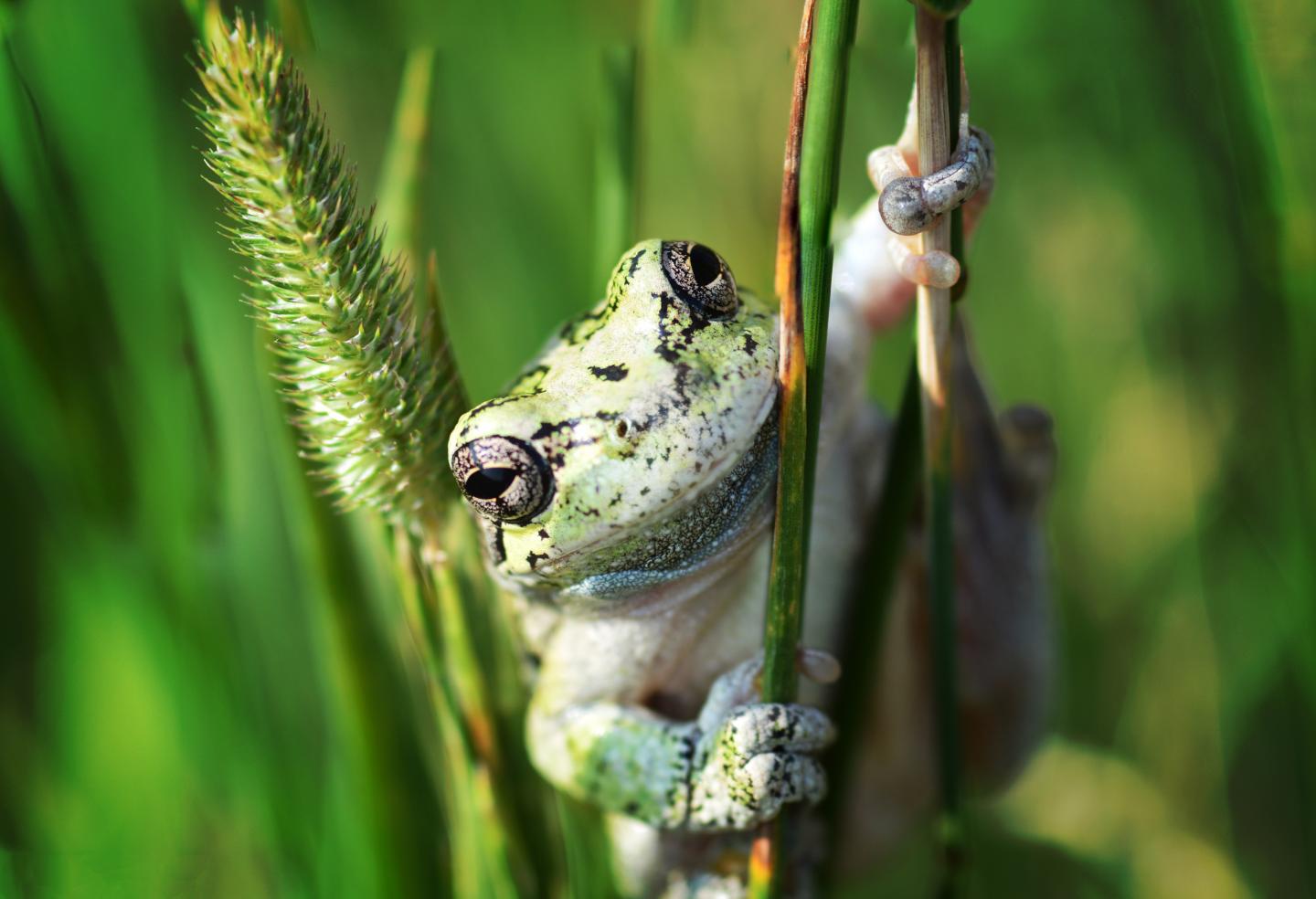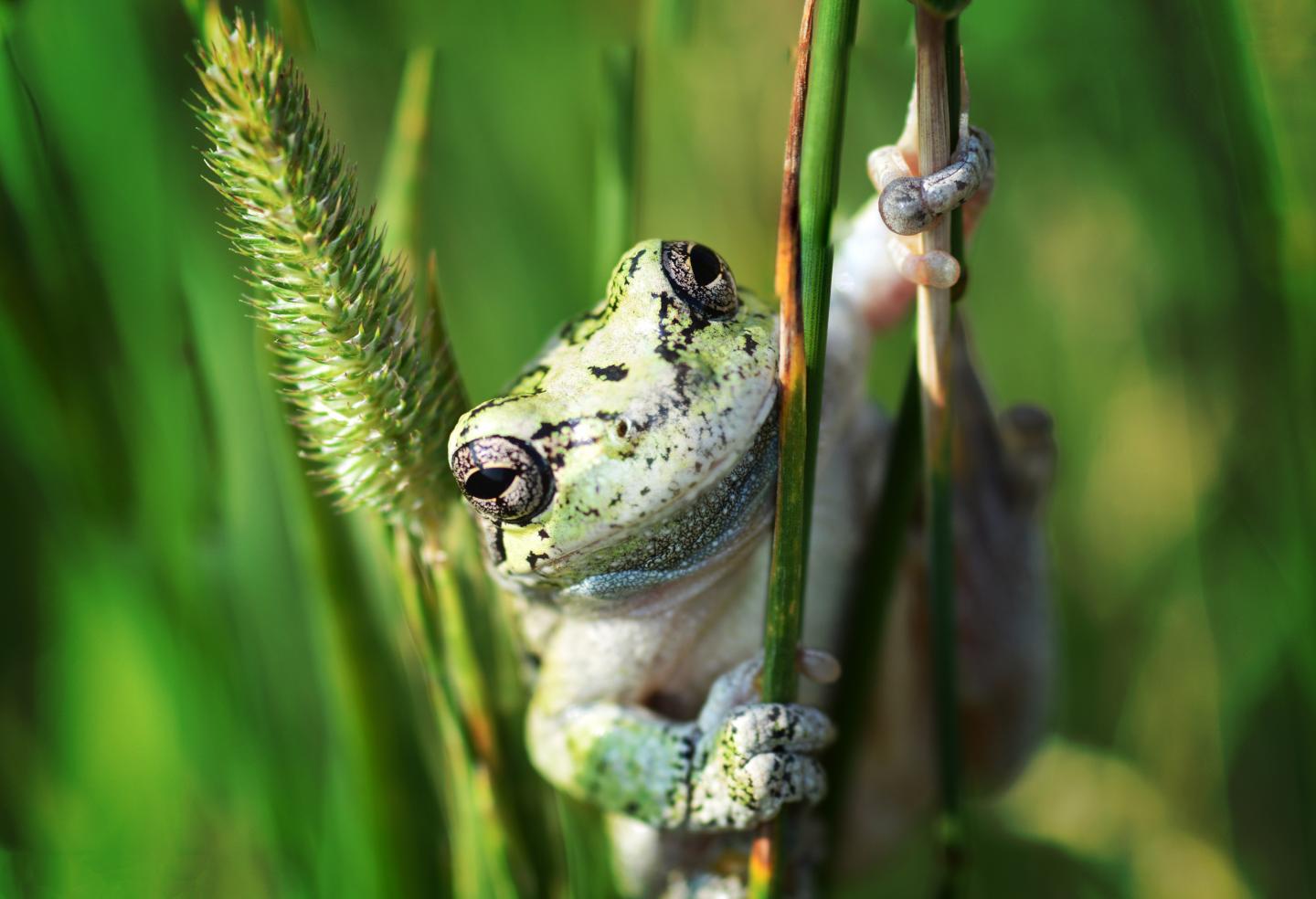
Credit: Image: Brian Mattes
Troy, N.Y. – Amphibians can evolve increased tolerance to pesticides, but the adaptation can make them more susceptible to parasites, according to a team that includes researchers at Rensselaer Polytechnic Institute. The research, led by Binghamton University, showed that wood frogs that evolved increased tolerance to pesticides showed greater susceptibility to a dangerous virus, although they also demonstrated reduced susceptibility to a parasitic worm.
"We have only recently begun to understand that amphibians can rapidly evolve tolerance to chemicals like pesticides, which on the surface is good news," said Rick Relyea, a professor of biological sciences and director of the Darrin Fresh Water Institute at Rensselaer. "But now comes the bad news: with that tolerance there is a tradeoff, which is that they become more susceptible to parasites that, in the case of ranavirus, can wipe out entire amphibian populations."
Previous research, led by Jessica Hua, a Binghamton University assistant professor, with the assistance of researchers at Rensselaer and Purdue University, showed that amphibians can evolve tolerance to pesticides in one of two ways. Amphibians that live close to agriculture can evolve higher baseline tolerance by passing tolerance on from generation to generation. Alternatively, if exposed to low levels of pesticides early in life, amphibians that live far from agriculture evolve the ability to induce higher pesticide tolerance within a few days, which is known as "inducible tolerance."
"While it is optimistic that amphibians can evolve tolerance to chemicals using multiple mechanisms, it is important to consider that pesticides are not the only stressor amphibians face," said Hua. "Amphibians are declining worldwide and other stressors such as parasites can interact with pesticides to contribute to these declines."
"Across their lifetime, amphibians encounter many different types of parasites and the parasite-specific responses we detected highlight the complexity of pesticide-parasite interactions," said Jason Hoverman, associate professor of Forestry and Natural Resources at Purdue University.
To understand whether land use or evolving pesticide tolerance comes at a cost when facing other stressors such as parasites, the team identified 15 wood frog populations that vary in their proximity to agriculture and displayed either higher baseline tolerance or inducible tolerance. Using these populations, they measured the relationship between land use, evolutionary responses to a pesticide, and susceptibility to two common parasites: a trematode worm and a ranavirus.
The results showed that amphibian susceptibility to parasites was related to their proximity to agriculture and their evolutionary responses to pesticide. For the trematode, wood frogs living closer to agriculture with high baseline tolerance had lower trematode loads than populations living far from agriculture with inducible pesticide tolerance. In contrast for ranavirus, a highly virulent pathogen capable of decimating amphibian populations, populations living close to agriculture with high baseline tolerance had higher viral loads than populations far from agriculture with inducible tolerance.
"Our results suggest that it is not enough to consider the effects of contaminants or parasites in isolation. Nature is complex," said Hua. "Not only do different stressors interact in ways that can be difficult to predict, but evolutionary responses to one stressor can shape amphibian responses to other stressors."
The research was part of a suite of experiments the team conducted to assess tolerance to pesticides, inducible tolerance, and the effects of pathogens on amphibian populations that varied in their induced or baseline tolerance, said Relyea. Rensselaer researchers were largely responsible for identifying the populations and conducting initial testing on pesticides.
"Our group has been leading the way in understanding how animals can rapidly evolve tolerance to pesticides," said Relyea, the David M. Darrin '40 Senior Endowed Chair at Rensselaer. "Five years ago, we didn't know that amphibians or any vertebrate animals could evolve induced tolerance to pesticides. This is a new layer of the effort, which is to ask: are there tradeoffs to rapidly evolving increased tolerance to pesticides?"
###
The paper, "Evolved pesticide tolerance influences susceptibility to parasites in amphibians," published in Evolutionary Applications, can be found using the DOI: 10.1111/eva.12500.
Relyea's research is enabled by the vision of The New Polytechnic, an emerging paradigm for higher education which recognizes that global challenges and opportunities are so great they cannot be adequately addressed by even the most talented person working alone. Rensselaer serves as a crossroads for collaboration — working with partners across disciplines, sectors, and geographic regions — to address complex global challenges, using the most advanced tools and technologies, many of which are developed at Rensselaer. Research at Rensselaer addresses some of the world's most pressing technological challenges — from energy security and sustainable development to biotechnology and human health. The New Polytechnic is transformative in the global impact of research, in its innovative pedagogy, and in the lives of students at Rensselaer.
About Rensselaer Polytechnic Institute
Rensselaer Polytechnic Institute, founded in 1824, is America's first technological research university. For nearly 200 years, Rensselaer has been defining the scientific and technological advances of our world. Rensselaer faculty and alumni represent 85 members of the National Academy of Engineering, 17 members of the National Academy of Sciences, 25 members of the American Academy of Arts and Sciences, 8 members of the National Academy of Medicine, 8 members of the National Academy of Inventors, and 5 members of the National Inventors Hall of Fame, as well as 6 National Medal of Technology winners, 5 National Medal of Science winners, and a Nobel Prize winner in Physics. With 7,000 students and nearly 100,000 living alumni, Rensselaer is addressing the global challenges facing the 21st century–to change lives, to advance society, and to change the world. To learn more, go to http://www.rpi.edu.
Media Contact
Mary Martialay
[email protected]
@rpinews
http://news.rpi.edu/
Original Source
https://news.rpi.edu/content/2017/08/14/frogs-adapt-pesticides-are-more-vulnerable-parasites





